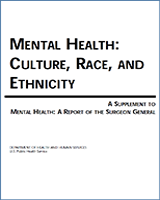NCBI Bookshelf. A service of the National Library of Medicine, National Institutes of Health.
Excerpt
This Supplement to Mental Health: A Report of the Surgeon General (U.S. Department of Health and Human Services [DHHS], 1999) documents the existence of striking disparities for minorities in mental health services and the underlying knowledge base. Racial and ethnic minorities have less access to mental health services than do whites. They are less likely to receive needed care. When they receive care, it is more likely to be poor in quality.
Contents
- Message from Tommy G. Thompson
- Foreword
- Preface
- Acknowledgments
- Chapter 1. Introduction
- Chapter 2 Culture Counts: The Influence of Culture and Society on Mental Health
- Chapter 3 Mental Health Care for African Americans
- Chapter 4 Mental Health Care for American Indians and Alaska Natives
- Chapter 5 Mental Health Care for Asian Americans and Pacific Islanders
- Chapter 6 Mental Health Care for Hispanic Americans
- Chapter 7 A Vision for the Future
- Appendix A Inclusion of Minorities in Controlled Clinical Trials Used to Develop Professional Treatment Guidelines for Major Mental Disorders
- Appendix B Resource Directory
Suggested citation:
U.S. Department of Health and Human Services. (2001). Mental Health: Culture, Race, and Ethnicity—A Supplement to Mental Health: A Report of the Surgeon General. Rockville, MD: U.S. Department of Health and Human Services, Substance Abuse and Mental Health Services Administration, Center for Mental Health Services.
- NLM CatalogRelated NLM Catalog Entries
- Minority Response to Health Insurance Coverage for Mental Health Services.[J Ment Health Policy Econ. 2001]Minority Response to Health Insurance Coverage for Mental Health Services.Thomas KC, Snowden LR. J Ment Health Policy Econ. 2001 Mar 1; 4(1):35-41.
- The Institute of Medicine report "Unequal Treatment": implications for academic health centers.[Mt Sinai J Med. 2004]The Institute of Medicine report "Unequal Treatment": implications for academic health centers.Betancourt JR, Maina AW. Mt Sinai J Med. 2004 Oct; 71(5):314-21.
- Disparities in access to care and satisfaction among U.S. children: the roles of race/ethnicity and poverty status.[Public Health Rep. 2005]Disparities in access to care and satisfaction among U.S. children: the roles of race/ethnicity and poverty status.Shi L, Stevens GD. Public Health Rep. 2005 Jul-Aug; 120(4):431-41.
- Review Economic, clinical, and humanistic outcomes (ECHOs) of pharmaceutical care services for minority patients: a literature review.[Res Social Adm Pharm. 2013]Review Economic, clinical, and humanistic outcomes (ECHOs) of pharmaceutical care services for minority patients: a literature review.Cheng Y, Raisch DW, Borrego ME, Gupchup GV. Res Social Adm Pharm. 2013 May-Jun; 9(3):311-29. Epub 2012 Jul 25.
- Review Race, ethnicity, and pain among the U.S. adult population.[J Health Care Poor Underserved...]Review Race, ethnicity, and pain among the U.S. adult population.Shavers VL, Bakos A, Sheppard VB. J Health Care Poor Underserved. 2010 Feb; 21(1):177-220.
- Mental Health: Culture, Race, and EthnicityMental Health: Culture, Race, and Ethnicity
Your browsing activity is empty.
Activity recording is turned off.
See more...
